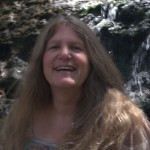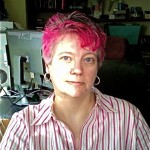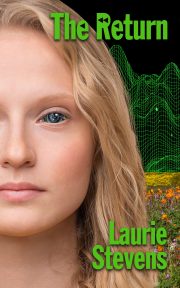Interview with SFWA member Brenda Cooper
by Cat Rambo

Brenda Cooper, from brenda-cooper.com
Science fiction writer and futurist Brenda Cooper’s latest book, WINGS OF CREATION, came out in November 2009 from Tor Books. Her short stories have appeared in Analog, Asimov’s, and multiple anthologies, among other places, and she is also the author of THE SILVER SHIP AND THE SEA, READING THE WIND, and HARLEQUIN’S MOON (with Larry Niven). She blogs at http://www.brenda-cooper.com.
One of the many interesting things about you is that you’re not simply an SF writer, but a futurist. What is a futurist, and what do you do in that role?
In simple terms, a futurist thinks about the future in some professional capacity. There are full-time futurists that work expressly in one industry. Some larger companies have their own internal futurists. I am more of a generalist – I keep up on the trends happening across a number of areas (like demographics, technology, energy, space, and robotics) and write about these in my Today’s Tomorrows column at FUTURISMIC, and occasionally talk to business audiences about them. Many people do this full time. I do it part time as well as writing sf part time, and still have a regular day job in technology. As it happens, there is great synergy between having a technology job (I’m a Chief Information Officer for a city), studying and writing about the future, and writing sf. Many sf writers are also futurists and some cop to the title – David Brin, Karl Schroeder, Charlie Stross and others. Paolo Bacigalupi was using futurist skills to create the impressively detailed world in his award winning book THE WINDUP GIRL, although I have no idea if he claims a futurist title.
What’s one thing you’ve predicted that you’re seeing manifest today? Are there any places where you went wrong?
Well, first, futurists aren’t really predictors. Kind of. But we can’t tell you what lottery numbers to pick. A place where we were right was shifts in population based on age and country. I learned about the problem of too little population in first world countries from my futurist mentor, Glen Hiemstra, and ten years ago audiences didn’t believe us. Now they do. I’m currently talking about how revolutionary three-D printing will be, and most people don’t believe me. Many less geeky audiences don’t even know it exists.
Futurists are often wrong. Flying cars and jetpacks are iconic, although you can get both now. Neither is ever likely to mainstream. We also screw up the timing a lot – miss the complexities of actual adoption or the speed of a new fad. I missed social networking completely.
What are the most interesting technological trends this year? Are you using any in your writing?
Three-D printing is a huge game changer. Even though the technology is still somewhat expensive and limited, it will become the preferred process for manufacturing many things. Since each print run can be unique, 3D print can create art, custom designed jewelry, one-off unique parts and perhaps eventually even organs. There is a 3D printer today that prints blood vessels. Paired with advances in nanotechnology, 3D printers may eventually be able to start with a wide variety of raw material.
We are seeing more change in computer user interfaces right now than we saw in the past ten years. Between Apple’s iPads and iPhones with touch interfaces and FaceTime, Nintendo’s Wii (not as new, but still significant), Microsoft’s Kinect, and significant enhancements in various gaming worlds, the way that we interact with computers is finally changing for the better. In fact, I’m willing to predict that within five years, the typical desktop and even laptop form factors are going to look very dated.
Ebooks are finally maturing and gaining both business models and integration with other forms of entertainment. The publishing and distribution models for the written word are changing so fast I can’t keep up. Within a decade I expect to see physical books become rare (but not disappear) and physical magazines even rarer. The book will become almost as obsolete as the music CD. Which, by the way, doesn’t make me happy. But the future has no responsibility to make me happy.
There is a ton of interesting stuff going on with robotics as we’re teaching them how to walk, how to interact more naturally with humans, and how to be soldiers. Although we don’t see much more than Roomba’s in daily life today, I predict that will change pretty fast. I did write a story called which came out in Analog earlier this year based on an article I read about robots being used for child-care in Japan. The story is called “The Robot’s Girl.”
What are the places where you get your technology information?
Everywhere. Twitter. CNN. Nature. MIT Technology Review. TED talks. A fabulous conference called Future in Review, or FiRE, that’s run by a local futurist named Mark Anderson. From my friends, who tend to the geeky side. From the Seattle Times, and our local TechFlash Blog. Seattle Geekly. NPR Science Friday….I could fill pages. Information is like ideas for fiction – everywhere.
What’s your online life like – where do you blog and participate in social networks?
I use Twitter the most (@brendacooper), and blog at my own website, www.brenda-cooper.com. I write a column for Futurismic. I’m on FaceBook.
How has online life changed for writers? What opportunities present themselves that writers might want to take advantage of?
For starters, some of the best markets are now online. There is a fabulous resource up on Kristine Kathryn Rusch’s website called “The Freelancer’s Survival Guide” and her husband Dean Wesley Smith’s slightly more prickly blog, “Killing the Sacred Cows of Publishing,” which is bound to make any writer evaluate a lot of things they thought were true, but which just might not be. SFWA has excellent information for members and non-members.
Most importantly, an online presence lets your readers get to know you. Publishers aren’t spending the same attention on marketing any but the most anticipated or exceptional works, and it’s much more up to authors to market. Yet direct marketing by authors often backfires. Who wants to be urged over and over to buy a book they don’t want? So we have to market ourselves as people and be interesting and authentic. This is not always easy.
I’d be remiss if I didn’t mention that there is dark side to online life. Not the people who pretend to care about the size of your penis or the people trying to sweet-talk you into your Nigerian inheritance, but the time drain. It’s easy to be online for two hours and lose your whole writing day.
How did you start writing science fiction? What draws you to that field?
I’ve loved science fiction as long as I remember. When I was a little girl, I used to lie on my back in the grassy hills of California and look up at the stars and wish I understood how everything worked. And science fiction is a fun way to work on that goal, even though now that I’m an adult I realize I’ll never really get there.
You’ve collaborated with Larry Niven on a book, Building Harlequin’s Moon. How did that project come about and what was the collaborative process like?
Steve Barnes is one of my friends and mentors. He is, of course, a regular collaborator with Larry. Steve introduced me to Larry and eventually I got brave enough to ask Larry if he would write with me. He said (kindly), “I don’t write with amateurs.” I thought that was that until once we were at the same convention and I showed him my very first fan emails, and he asked to see my writing. I was working on the story that eventually became “Ice and Mirrors” which came out in Asimov’s. Larry liked it, and could see the myriad things that were wrong with it, and I guess he got intrigued.
Writing with Larry was a great opportunity. Mostly it was a remote collaboration done via emails, and he was a patient and exacting teacher and a brilliant contributor. Wed didn’t actually see each other very often as we live in different states and have different lives.
Do you have a “dream writer” you’d like to collaborate with?
Neil Gaiman. I’d love to learn his storytelling skills. Steven King. I don’t know any other writer so in control of the affect of his prose on the reader, down to the word and the punctuation level as well as story.
When you’re reading SF, who are the authors you look for?
Paolo Bacigalupi, Ted Chiang, Robert Sawyer, Allan Steele, Nancy Kress, Rachel Swirsky, Kij Johnson, Greg Bear, David Brin, Kim Stanley Robinson, Tobias Buckell, Connie Willis, Karl Schroeder, Molly Gloss…Oh, and you. I could go on for a long time…
What, in your writing, are you most proud of?
That my work is described as “character driven” and that once a woman walked up to me at a convention and said that my book, The Silver Ship and the Sea, made her like science fiction again.
What are you currently working on? What difficulties present themselves in that project?
I’m obsessed with a novel that explores the way a single individual can affect a whole society in the way that Eva Peron affected Argentina. I’ve set the story in a generation ship. It’s a huge challenge because the topic is big, the legend is big, and the main character is really complex and difficult. She isn’t someone most of us would like if we met her on the street, although we might admire her, or be awed by her. I guess I’d say I’m writing at the edge of my comfort and skill zone, in a little bit of a scary place.
Where do you find your writing community and support?
The Seattle area writing community is vast and brilliant and helpful. My partner and my family are very patient. I’ve also met a number of people that are sort of extended support through workshops designed for professional writers. Also, my friends in the futurist community are supportive.
—
 Cat Rambo lives and writes in the Pacific Northwest. Her collection, Eyes Like Sky And Coal And Moonlight, is an Endeavor Award finalist this year. Both it and The Surgeon’s Tale And Other Stories (with Jeff VanderMeer) are available on Amazon.com. She is the fiction editor of Fantasy Magazine. Upcoming appearances include the Write on the River workshop, SteamCon and World Fantasy Con. Her website appears at http://www.kittywumpus.net.
Cat Rambo lives and writes in the Pacific Northwest. Her collection, Eyes Like Sky And Coal And Moonlight, is an Endeavor Award finalist this year. Both it and The Surgeon’s Tale And Other Stories (with Jeff VanderMeer) are available on Amazon.com. She is the fiction editor of Fantasy Magazine. Upcoming appearances include the Write on the River workshop, SteamCon and World Fantasy Con. Her website appears at http://www.kittywumpus.net.


